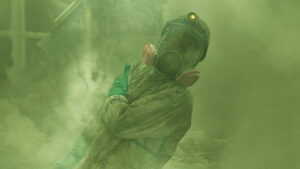Fukushima drama has a spark

TV REVIEWThe DaysNetflix
OVER a month ago, Netflix dropped a disaster drama that largely went undiscussed despite its similarities with the acclaimed HBO miniseries Chernobyl. As a true-to-life dramatization of a nuclear accident, The Days is phenomenal.
It’s based on the book On the Brink: The Inside Story of Fukushima Daiichi, which chronicles the events that followed the Great Eastern Japan Earthquake of 2011 from the perspective of the nuclear plant workers and their families.
The earthquake, which occurred on March 11, 2011, disrupted electrical supply to the nuclear plant. A subsequent tsunami then flooded the site and rendered its generators useless. Without power, it became near-impossible to cool the nuclear reactors, resulting in one of the world’s worst nuclear crises.
This is where this reporter’s motivation to watch the miniseries comes in: 12 years after the disaster, the Fukushima Daiichi Nuclear Power Plant is still making headlines. (Related story: https://www.bworldonline.com/world/2023/07/04/532167/how-japan-plans-to-release-fukushima-water-into-the-ocean/)
Tokyo Electric Power Company, the plant’s operator, will be dumping 1.3 million tons of treated nuclear wastewater into the Pacific Ocean as part of ongoing cleanup efforts. As of 2023, the plant has been losing space to store the contaminated water that was used to cool the reactors in the incident.
By filtering the water to remove radionuclides, both the Japanese government and the regulators have assured that it will be harmless to marine life. Since it contains tritium, an isotope proven difficult to eliminate, it will be diluted in seawater a hundred times until it is safe enough to release.
The International Atomic Energy Agency (IAEA) has said the plan meets international standards and is not harmful to the environment, but fisherfolk and activists from various countries in the Pacific, including the Philippines, are up in arms. (Related podcast episode here: https://open.spotify.com/episode/25rEe4kEkDUaxOzPRJpToz])
A valid criticism of stories on nuclear power is the tendency to depict it as nothing but doom and gloom. The Days shows both its horrors and its fascinating technologies. It allows us to appreciate how we’ve put systems in place to harness nuclear energy, and marvel at how fast things can break down.
One would think that a show on the worst nuclear disaster since Chernobyl would be hard to put down and talked about for a while, but The Days’ downfall was its extreme attention to every detail. All bits of information had moments in the series, from the exact reading of kilopascals of pressure to the repetitive subplots of government figures talking in circles.
At first, watching hardworking employees don hazmat suits and shine flashlights within the dark facility, with possible risk to their lives, was thrilling — but not after the third or fourth time. Faster pacing would have cut things down to four or five episodes instead of the dragging, eight-episode miniseries it eventually became.
However, it provided great emotional insight into the devastating events that effectively shut down the Fukushima nuclear power plant for good, highlighting the courage and resourcefulness that the crew on-site had to use to keep the situation under control (until, of course, it could no longer be controlled). The excellent buildup of tension, authentic performances, and immersive visual effects kept me interested.
Koji Yakusho, who plays the power plant’s station manager Masao Yoshida, gives an impressive performance. The length of the series provided ample ground for him to display his acting prowess, transforming from a jolly, well-loved boss to a harsh yet practical leader in a life-or-death situation.
The displeased and always impatient Japanese prime minister Azuma Koshiishi is also played effectively by Fumiyo Kohinata, who channels an impulsive energy in the role as he yells at the bumbling, unprofessional people that surround him.
Often at odds with the Tokyo Electric Power Company (TEPCO), which struggles to get Japan’s power grid together after the disaster, the government side of boardroom meetings and urgent phone calls show the Japanese in a light that outsiders don’t often see — uncertain, incompetent, lacking coordination.
It makes for compelling television, at least for the first few frantic conversations that shift from government to power company to power plant, after which the redundancy of following every minor change in events as per real accounts causes the whole piece to suffer.
But even though the filmmakers’ commitment to factual storytelling was unwavering to a fault, its bookend first and final episodes stood out for sheer thematic impact.
The first episode is exactly what you’d expect from a horrific disaster epic: scenes of unimaginable destruction as the earthquake and tsunami hit the plant. It may even be the outlier in the entire series, shot like a traumatizing man versus nature horror film rather than an informative drama.
The last episode features a haunting epilogue based on station manager Mr. Yoshida’s actual testimony, combining the actor’s voice as a narrator with images and videos contextualizing Japan’s history with nuclear power and beautiful yet sad scenes of the tragedy’s aftermath.
Most importantly, it gives a full update about how the facility is still being actively dealt with to this day, as Japan struggles to safely dismantle all nuclear-affected bits and pieces.Perhaps the same issues of toxic waste disposal, risks of meltdown, and differing views on the cost-benefit analysis of nuclear power will ebb and flow, time and again, as countries and governments waffle between what is necessary for our populations’ growing needs and what should cause alarm bells to ring.
The Days eventually comes to a conclusion, as did Mr. Yoshida’s life due to cancer, two years after he helped pull the plant out of its initial crisis. Like how the show often devolved into an endless array of detailed plot points and conflicts, the plant itself will take decades more to be fully dismantled. Meanwhile, the discussions that plague the topic of nuclear energy have yet to reach a conclusion. — Brontë H. Lacsamana




